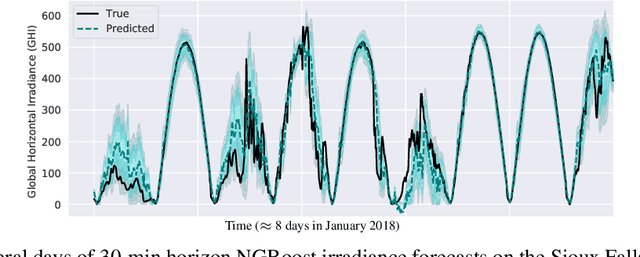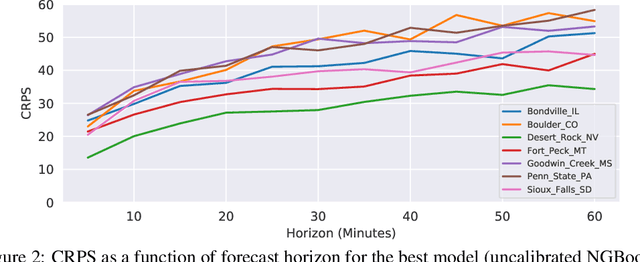Jack Kelly
Short-term Prediction and Filtering of Solar Power Using State-Space Gaussian Processes
Feb 01, 2023Abstract:Short-term forecasting of solar photovoltaic energy (PV) production is important for powerplant management. Ideally these forecasts are equipped with error bars, so that downstream decisions can account for uncertainty. To produce predictions with error bars in this setting, we consider Gaussian processes (GPs) for modelling and predicting solar photovoltaic energy production in the UK. A standard application of GP regression on the PV timeseries data is infeasible due to the large data size and non-Gaussianity of PV readings. However, this is made possible by leveraging recent advances in scalable GP inference, in particular, by using the state-space form of GPs, combined with modern variational inference techniques. The resulting model is not only scalable to large datasets but can also handle continuous data streams via Kalman filtering.
Short-Term Solar Irradiance Forecasting Using Calibrated Probabilistic Models
Oct 14, 2020



Abstract:Advancing probabilistic solar forecasting methods is essential to supporting the integration of solar energy into the electricity grid. In this work, we develop a variety of state-of-the-art probabilistic models for forecasting solar irradiance. We investigate the use of post-hoc calibration techniques for ensuring well-calibrated probabilistic predictions. We train and evaluate the models using public data from seven stations in the SURFRAD network, and demonstrate that the best model, NGBoost, achieves higher performance at an intra-hourly resolution than the best benchmark solar irradiance forecasting model across all stations. Further, we show that NGBoost with CRUDE post-hoc calibration achieves comparable performance to a numerical weather prediction model on hourly-resolution forecasting.
Short-term prediction of photovoltaic power generation using Gaussian process regression
Oct 05, 2020



Abstract:Photovoltaic (PV) power is affected by weather conditions, making the power generated from the PV systems uncertain. Solving this problem would help improve the reliability and cost effectiveness of the grid, and could help reduce reliance on fossil fuel plants. The present paper focuses on evaluating predictions of the energy generated by PV systems in the United Kingdom Gaussian process regression (GPR). Gaussian process regression is a Bayesian non-parametric model that can provide predictions along with the uncertainty in the predicted value, which can be very useful in applications with a high degree of uncertainty. The model is evaluated for short-term forecasts of 48 hours against three main factors -- training period, sky area coverage and kernel model selection -- and for very short-term forecasts of four hours against sky area. We also compare very short-term forecasts in terms of cloud coverage within the prediction period and only initial cloud coverage as a predictor.
Neural NILM: Deep Neural Networks Applied to Energy Disaggregation
Sep 28, 2015



Abstract:Energy disaggregation estimates appliance-by-appliance electricity consumption from a single meter that measures the whole home's electricity demand. Recently, deep neural networks have driven remarkable improvements in classification performance in neighbouring machine learning fields such as image classification and automatic speech recognition. In this paper, we adapt three deep neural network architectures to energy disaggregation: 1) a form of recurrent neural network called `long short-term memory' (LSTM); 2) denoising autoencoders; and 3) a network which regresses the start time, end time and average power demand of each appliance activation. We use seven metrics to test the performance of these algorithms on real aggregate power data from five appliances. Tests are performed against a house not seen during training and against houses seen during training. We find that all three neural nets achieve better F1 scores (averaged over all five appliances) than either combinatorial optimisation or factorial hidden Markov models and that our neural net algorithms generalise well to an unseen house.
 Add to Chrome
Add to Chrome Add to Firefox
Add to Firefox Add to Edge
Add to Edge